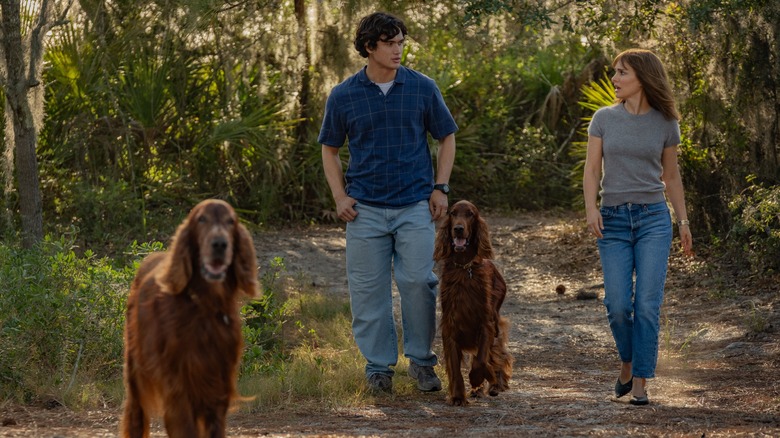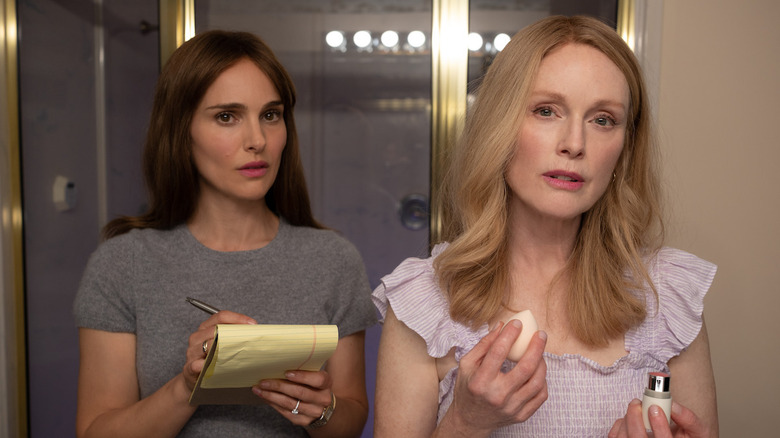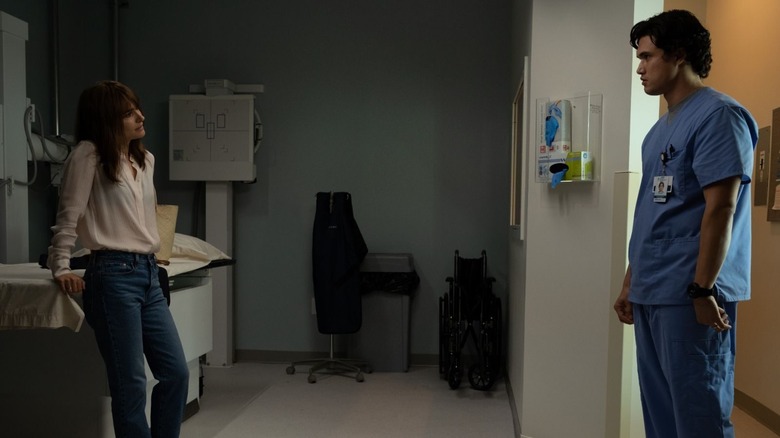The Forgotten Thriller That Inspired May December's Soundtrack
The boundary-pushing melodrama "May December" is a tonally unique film, and the stand-out score electrifies the audience into this strange mood. The dramatic piano music matches the off-beat camp of the absurd comedic moments, while more eerie dissonant notes immediately foreshadow the dark subject matter ahead. The film was composed by Marcelo Zarvos, an accomplished composer and proficient piano player. However, some of the music was taken straight from Joseph Losey's 1971 romance thriller "The Go-Between."
Todd Haynes' 2023 film follows an actress' background research as she prepares for a fictional adaptation of a true crime story about a woman who had an affair with a 13-year-old at age 36. Their relationship was the subject of tabloid fodder in the '90s, but the controversial couple remained married well into the boy's adulthood and raised several children together. However, the actress' arrival brings up questions for the young man about his relationship. Much like the hit Netflix movie, "The Go-Between" is also about forbidden love and even follows the infatuation of a teenage boy with an older woman.
Given the similarities in subject matter, it makes sense that Haynes thought of Losey's film when he read the script for "May December," written by Samy Burch. But the thing about the '71 period drama that always stuck in Haynes' memory was the chilling piano score. He knew right away that it would be a perfect fit for his latest film. Lots of films have piano scores, but this one is so distinct and emotional. It sounds like Dracula is tickling the ivories himself. But in all the score's eccentricity, Haynes was right — it couldn't have been a better match for "May December."
Music from The Go-Between was incorporated into May December's score
The "Safe" director initially saw "The Go-Between" the year that it came out — Haynes was only ten years old at the time. He wasn't able to get his hands on the movie for a while afterward, but the score stuck with him.
"It's a movie that had sort of fallen out of distribution or visibility for decades," he said of the '71 Losey film to Interview. "I think I saw it when I was a kid and hadn't seen it since. And I heard that Michel Legrand score and I was just like, 'What the f***?' It opens up your eyes, it pricks up your ears. You're watching the frame with this acute attention to what this ominous, hardcore, in-your-face score is portending."
Before he even began shooting "May December," Haynes knew he wanted to incorporate Michael Legrand's score into the process.
"The music was an early accompaniment to this whole experiment and this sort of visual style I stumbled on," the filmmaker expanded. "[...] we literally performed to it. We played that music during the shoot, in every single scene where there wasn't dialogue, where I had a music cue placed. It was thrilling."
Haynes hoped to capture the "excitement" of Losey's film by incorporating the score, and he succeeded. The cascading notes leave the listener steeped in anticipation. The film is unpredictable, and the stakes get unbearably high. The music builds the tension higher and higher for the entire duration of the film before the emotional climax.
The composer liked using the score as a template
The score for "May December" ended up being a composite of Michael Legrand's score for "The Go-Between" and some original piano parts by Zarvos. Although the score from the '71 movie served as major inspiration, only a little bit of the original score made it into Haynes' film. Zarvos apparently played the piano for "two-thirds" of the score, the composer revealed to Below the Line.
However, Losey's music did serve as a useful template for Zarvos to expand upon. Some composers prefer to have a blank canvas rather than use other music as a direct source of inspiration, but Zarvos appreciates the guideposts.
"I'm not one of those composers who hates temp music," he continued. "It can save a lot of time. In finding the tone of the film, sometimes things have to go fast. [...] It can tell me a lot about what to do, but it can tell me even more about what not to do."
The "Wonder" composer prefers to save time by using "any tool available" to understand his director's vision for a given film. Having temp music can save him as much as "a couple of weeks" in helping him discover the "zone" of sounds for the score.
The music from "The Go-Between" was just one small part of what made "May December" so great, but everyone involved in the project knew just how important it was. The melodramatic piano played in no-dialogue moments to motivate the actors' performances. Even the screenwriter said she liked how the score "slaps you in the face," per Indiwire. "I had a lot of those elements, but when you see it all together, it was euphoric."
"May December" is currently available to stream on Netflix.


